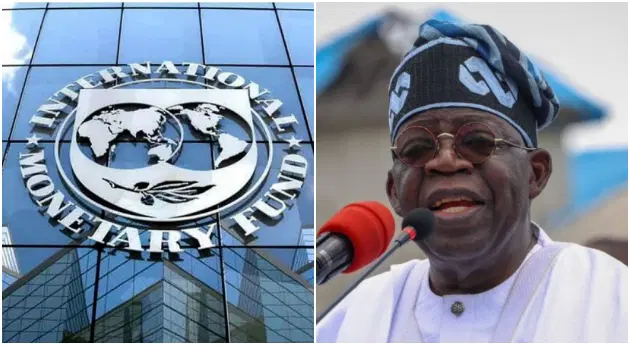IMF Trims Nigeria’s Growth Forecast, says 3% is Now a Stretch, gives reasons

The International Monetary Fund (IMF) has revised Nigeria’s growth outlook downward for the second time in less than six months — a sobering reminder that despite bold reforms, the path to recovery remains uphill for Africa’s largest economy.
According to the IMF’s April 2025 World Economic Outlook, Nigeria is now projected to grow at 3.0% in 2025, down from the earlier 3.2% estimate. For 2026, the outlook is even more conservative — 2.7%, compared to the previous 3.0%.
What’s Behind the Downgrade?
Several global and domestic forces are converging to weigh on Nigeria’s economic trajectory:
- Falling global demand for oil, which remains Nigeria’s dominant export and forex earner
- Persistent global trade tensions and reduced demand from advanced economies
- A sharp drop in crude oil prices, exacerbated by slowing industrial output in China and geopolitical disruptions
- Rising concerns over a global recession, with the IMF estimating a 40% likelihood — up from 25% in late 2024
“The uncertainty is discouraging investment and activity, and these countries are suffering from declining demand for their exports,”
— Pierre-Olivier Gourinchas, IMF Economic Counsellor
📉 Macro Outlook: What It Means for Nigeria
While Nigeria remains in positive growth territory, the country’s underperformance relative to Sub-Saharan Africa’s regional average is a key concern.
| Metric | Nigeria (2025) | SSA Average (2025) |
| GDP Growth | 3.0% | 3.8% |
| Current Account Surplus | 6.9% of GDP | N/A |
| Oil Dependence | ~80% exports | Varies |
At a time when peers like Côte d’Ivoire and Angola are expanding access to foreign capital and diversifying aggressively, Nigeria’s growth continues to lag regional benchmarks, partly due to its heavy reliance on oil and an underperforming non-oil sector.
💡 A Glimmer of Optimism: Reforms Paying Off?
Despite the downgrade, there are positive indicators that Nigeria’s economic fundamentals are improving under the current reform-driven administration:
- Return to the Eurobond market in late 2024 — its first issuance since 2022 — signals renewed investor confidence
- Exchange rate unification, subsidy removal, and other fiscal reforms have helped stabilize the macroeconomic outlook
- Sovereign eurobond spreads for frontier economies have narrowed, benefiting Nigeria’s borrowing profile
- Nigeria’s current account balance remains in surplus — 6.9% of GDP in 2025 and projected at 5.2% in 2026
“Sovereign spreads widened briefly, but Nigeria’s re-entry into the market shows reform momentum is being recognized,”
— Jason Wu, Assistant Director for Global Markets, IMF
But Risks Persist
The IMF warns that Nigeria’s progress could be derailed without decisive policy action. Key vulnerabilities include:
- Financial volatility, triggered by weak global investor appetite
- Exposure to commodity price shocks, especially oil
- Continued FX market instability despite reforms
- Insufficient domestic demand and rising inflation pressures
What Nigeria Must Do to Hit — and Exceed — 3%
Hitting a 3% growth target in a fragile global environment will require more than reform headlines. Experts point to five levers Nigeria must pull:
- Accelerate diversification: Boost non-oil exports, agriculture, tech, and manufacturing
- Invest in productivity: From power to infrastructure and logistics
- Strengthen the financial sector: Deepen domestic capital markets and enhance investor protections
- Curb inflation sustainably: Through tight monetary policy and food supply chain improvements
- Expand tax base and improve revenue collection: To reduce debt reliance
Nigeria in Context: The Regional Race
While Nigeria struggles to maintain 3% growth, Sub-Saharan Africa is forecast to rebound to 4.2% by 2026. Other frontier economies are making strides:
| Country | 2025 Growth Forecast | Notable Developments |
| Côte d’Ivoire | 6.5% (est.) | Largest Eurobond issuance in Africa (Q1 2025) |
| Angola | 3.9% | Innovative financing via return swaps |
| Ghana | Recovery underway | Major debt restructuring deal concluded |
| South Sudan | -31.5% | Severe downgrade due to oil pipeline failure |
| South Africa | 1.5% | Hampered by poor 2024 performance |
The Reality Behind the Numbers
Growth is no longer just about recovery — it’s about resilience and reinvention.
The IMF’s downgrade is a wake-up call: Nigeria must act decisively or risk being outpaced not just by global peers, but by regional neighbors quickly adjusting to the new economic order.
Nigeria can still outperform expectations, but only if reforms translate into real-sector growth, investor confidence, and inclusive development.












